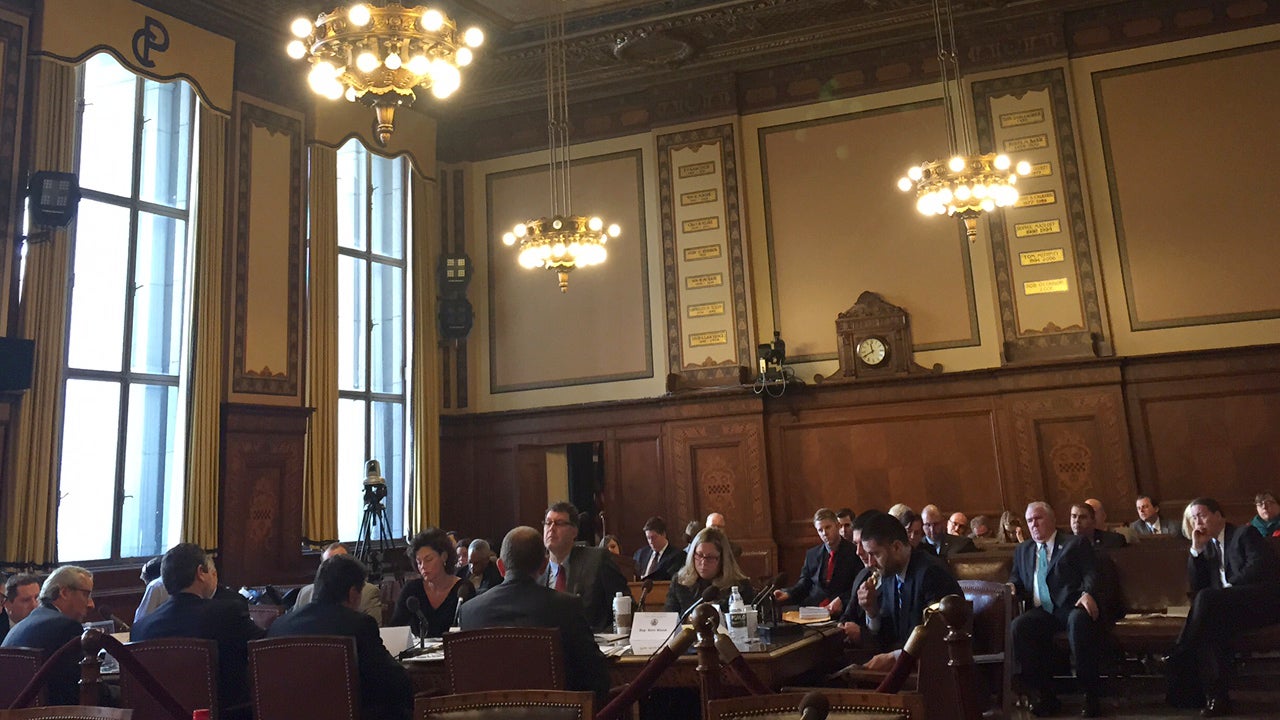Local pensions need statewide solutions, lawmakers say

Members of the House Urban Affairs Committee met in Pittsburgh with local Council members and other stakeholders to talk about municipal pensions. (Irina Zhorov/Keystone Crossroads)
As state lawmakers look to pension reform, local leaders weigh in.
Municipal pension funds in Pennsylvania are underfunded by a combined $7.7 billion and many local lawmakers are pointing to state-level reforms as the solution. The State House of Representatives’ Urban Affairs Committee met with local leadership in Pittsburgh this week to learn about what exactly municipalities want to see happen in the state legislature.
Pittsburgh Mayor Bill Peduto started the meeting off by comparing the municipal pension problem to a sinking boat.
“It’s sort of like being in a boat where the hole in the bottom is greater than the barrel that you have,” he said. “And you can continue to try to take the water out of the boat but the boat continues to sink. Under the current system our current employees will not be able to receive their pensions.”
Peduto said the city has taken steps to plug up its damaged vessel, but he and city council members said further reforms are needed at the state level. A myriad of state laws shape how municipal pension are managed and what they provide. Peduto wants to see state laws raise the minimum retirement age to reflect longer lifespans, shift to a different system for new hires, set consistent employee contributions, mandate the use of more realistic rates of return in projections, and eliminate the use of overtime in calculating pensions.
Councilwoman Natalia Rudiak focused her testimony on the state aid formula. Under Act 205, the state gives money to distressed municipalities to help them meet pension payments, but Rudiak said the formula boosts smaller, wealthier municipalities at the expense of distressed larger ones. She said while fiscally troubled communities like Pittsburgh are receiving less and less state aid, fiscally sound jurisdictions like Upper St. Clair are receiving enough to cover their entire yearly payouts. In 2012, Upper St. Clair paid out $441,000 in benefits and received $500,677 in state aid. She said the inequity allows municipalities like Upper St. Clair to invest more in services while Pittsburgh has to dedicate more and more funds to pension payments.
Dick Hadley, Executive Director of the Allegheny League of Municipalities, tried to strike a less alarming note with the committee. He pointed out that the majority of municipalities’ pension plans in Pennsylvania are not distressed, and a majority of the distressed ones are just minimally so. He said his concerns are somewhat different for smaller municipalities than for the bigger, high-liability cities. “While there is legislation governing the rules and obligation of these plans there is not clear legislation dealing with the governance and administration of these plans,” his testimony read. “I would stress the need for enhanced educational opportunities for elected and appointed officials in managing and administering municipal pension plans.”
The meeting was the first in a series around the Commonwealth as state lawmakers plan to introduce pension reform legislation. Additional meetings have not yet been scheduled.
WHYY is your source for fact-based, in-depth journalism and information. As a nonprofit organization, we rely on financial support from readers like you. Please give today.


